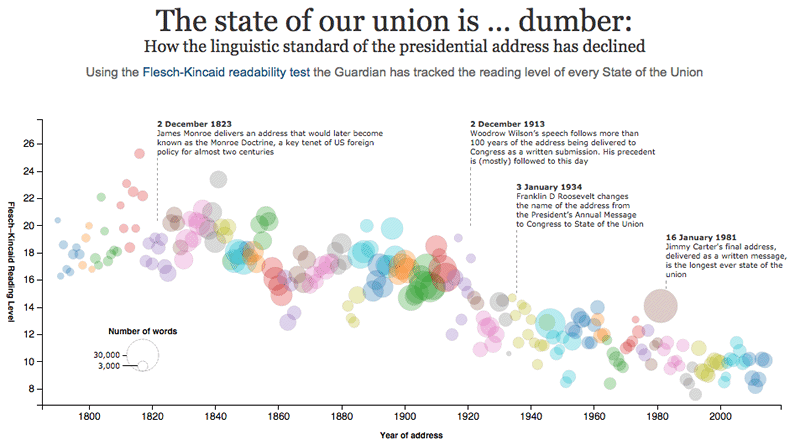Forrest Gump and the Difference Between Dumb and Simple
‘Dumb’ and ‘simple’.
Sometimes these words are interchangeable. For instance, Forrest Gump might be described by either word.
But other times they have very different meanings.
A couple of years ago the Guardian.com published a fascinating infographic titled ‘The state of our union is … dumber‘.
*Source: The Guardian
This interactive chart (try the original – mine is just a screencap) plots changes in the U.S. President’s State of the Union (SOTU) addresses from 1790 to 2014.
Even if you have no interest in politics, State of the Union addresses are useful because they provide over two hundred years of text sample data covering broadly similar subjects and themes. This makes them a great data source for anyone studying changes in the english language over the last 200 years.
Our Guardian SVG shows us two types of information:
- The size of each bubble shows the number of words in each speech (i.e. Big bubbles = long speeches)
- The height of each bubble gives its Flesch-Kincaid Reading Level.
The Flesch-Kincaid test estimates how difficult a passage of text is to understand – the lower the number, the easier the text is to understand.
As the graphic shows, SOTU addresses have been getting steadily easier to understand since about 1810, and generally shorter. In fact, President Obama’s recent address could be understood by an eighth-grader.
Modern Life is Rubbish
The weird part is that the Guardian and many others have cited this trend as evidence of a slip in education standards and the general decline of civilization. ‘How the linguistic standard of the presidential address has declined‘ lectures the subheading.
“Obama is only the latest in a long trend of dumbed-down addresses.” said Dailycaller.
It might just be me, but this seems crazy.
Whilst I’d hardly sing the praises of modern politics, surely this is evidence of an improving UX?
As design and UX people, we’re always searching for the simplest way to accomplish any goal. If user-testing showed a percentage of people didn’t understand our UIs, we’d go back to the drawing board.
Anyone who has the ability to make the complex simple is considered a rockstar. We applaud the simple. If the SOTU address was an app designed to deliver ideas to citizens, we’d be doing everything in our power to ensure it reached the largest possible audience.
However in journalism circles there seems to be an underlying belief that good ideas demand big words and long sentences.
What a strange position to take.
Here’s the second paragraph from President James Madison’s 1815 address.
In the terms stipulated the rights and honor of the United States were particularly consulted by a perpetual relinquishment on the part of the Dey of all pretensions to tribute from them. The impressions which have thus been made, strengthened as they will have been by subsequent transactions with the Regencies of Tunis and of Tripoli by the appearance of the larger force which followed under Commodore Bainbridge, the chief in command of the expedition, and by the judicious precautionary arrangements left by him in that quarter, afford a reasonable prospect of future security for the valuable portion of our commerce which passes within reach of the Barbary cruisers.
Wow. That is two sentences, 109 words and a Flesch-Kincaid grade level of 26.34.
Now, I don’t want to make this ‘National Beat Up James Madison Day’ as it’s a little unfair to read his text out of context and written in the voice of a different era. Nevertheless, I suspect most of us require some serious concentration to understand what he’s saying. I’ve read it 4 times now and I think I get it – but I’m crossing my fingers there won’t be a test later.
It’s undoubtedly an impressive command of the nuts and bolts of language, but is this the kind of writing we should aspire to for future addresses?

Steve Jobs talked about this subject many times over the years.
Simple can be harder than complex: You have to work hard to get your thinking clean to make it simple. But it’s worth it in the end because once you get there, you can move mountains.”
Here’s to the difference between simple and dumb.


